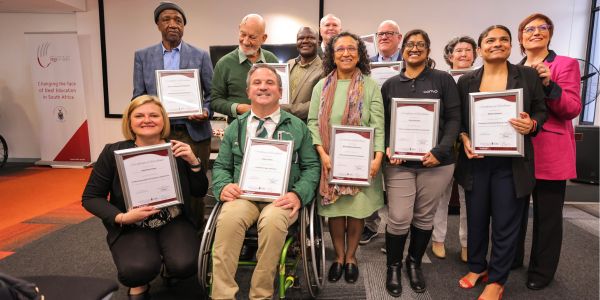A leap of faith and resilience
- Wits University
Agents at the heart of creating a better world for the Deaf community mark 25 years of impact and partnerships.

“If we waited for the money, we would be no where today.”
These were the words of Dr Claudine Storbeck who narrated the story of how the Centre for Deaf Studies at Wits came into being.
The Centre started with nothing but a resolve to change the educational outcomes and prospects of the Deaf community.
Storbeck approached Wits 25-years ago with a bold request.
“I said to Wits, give me an office and a phone – I will pay for my own phone bill and don’t give me a salary.”
This was a big gamble and an audacious move. Committing to working with no income could have serious consequences for her including destabilising her family household as a newlywed.
To her surprise, the University said yes to providing an office, marking a ‘U-turn’ as up until then, two other institutions had turned her down citing that Deaf education was not a strategic area at the time.
In the months to follow, she dispatched 50 sponsorship letters while at the same time assembling a team that would support the vision to establish South Africa’s first academic programme dedicated to the training of teachers for the Deaf.
The first to join her despite the lack of financial security was Lucas Mangongwa, then a school principal carving his own path in North West province as the first Deaf principal in South Africa to lead a school for the Deaf.
“I tell you these things because it shows what faith can do.”
“If we waited for the money, we would be nowhere today,” said Storbeck addressing dignitaries and well-wishers at the official celebration to mark the 25th anniversary of the Centre.
This initiative of humble beginnings yet big dreams has become a Centre of Excellence recognised by the Department of Education and Training. Beyond teaching and research, the Centre has been a key contributor towards building an inclusive society. It is the go-to partner for families of deaf and hard-of-hearing babies, which through the Hi Hopes programme, provides psycho-social and language support to families across six provinces. This reach is increasing. In addition, the Centre has a dedicated SafeSpace programme to support Deaf victims of gender-based violence (GBV).
Speaking at the celebration Wits Vice-Chancellor and Principal Professor Zeblon Vilakazi said the anniversary is “a remarkable milestone in the history of this 100-year-old institution. This milestone speaks about the key elements of this University, namely diversity, equity and inclusion.”
“It is a testament to the enduring spirit of our university,” said Vilakazi.
The event also served to honour Deaf Heroes who have made a significant contribution to the Deaf Ccommunity.
Building an eco-system
What began as a teaching programme to address the shortage of skilled teachers who can sign fluently and in tune with the needs of Deaf learners has evolved with the times filling a gap in the services provided to the Deaf community.
Adapting and innovating, the Centre has championed the availability of childrens’ books by producing a valuable resource for the socialisation and self-actualisation of Deaf children and families.
Rootz Resources produces books for deaf babies, available for in multi-media using both South African Sign Language and audio.
“Representation matters. The main characters in these books are Deaf babies who live full lives.”
The Centre also runs an entrepreneurship project on its premises and operates a coffee shop which employs Deaf baristas.
The Centre also houses data of the longest longitudinal study of Deaf babies in sub-Saharan Africa spanning 17 years.
Where to from here?
“The young Deaf leaders are going to pave the way,” said Storbeck.
“We are already looking for Deaf people to take over. The Centre for Deaf Studies is not about an individual but is driven by the Deaf community.”

